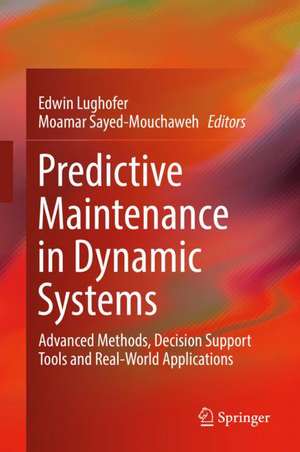Predictive Maintenance in Dynamic Systems: Advanced Methods, Decision Support Tools and Real-World Applications
Editat de Edwin Lughofer, Moamar Sayed-Mouchawehen Limba Engleză Hardback – 12 mar 2019
Preț: 1018.87 lei
Preț vechi: 1242.52 lei
-18% Nou
Puncte Express: 1528
Preț estimativ în valută:
194.98€ • 203.31$ • 162.05£
194.98€ • 203.31$ • 162.05£
Carte tipărită la comandă
Livrare economică 21 martie-04 aprilie
Preluare comenzi: 021 569.72.76
Specificații
ISBN-13: 9783030056445
ISBN-10: 3030056449
Pagini: 592
Ilustrații: XIII, 567 p. 200 illus., 144 illus. in color.
Dimensiuni: 155 x 235 mm
Greutate: 0.99 kg
Ediția:1st ed. 2019
Editura: Springer International Publishing
Colecția Springer
Locul publicării:Cham, Switzerland
ISBN-10: 3030056449
Pagini: 592
Ilustrații: XIII, 567 p. 200 illus., 144 illus. in color.
Dimensiuni: 155 x 235 mm
Greutate: 0.99 kg
Ediția:1st ed. 2019
Editura: Springer International Publishing
Colecția Springer
Locul publicării:Cham, Switzerland
Cuprins
Introduction.- Predictive Maintenance and (Early) FDD in Dynamic Systems.- Beyond State-of-the-Art.- Early Fault Detection and Diagnosis Approaches.- Prognostics and Forecasting.- Self-Reaction and Self-Healing Techniques.- Applications of Predictive Maintenance with emphasize on Industry 4.0 challenges.- Conclusion.
Notă biografică
Edwin Lughofer received his PhD-degree from the Johannes Kepler University Linz (JKU) in 2005. He is currently Key Researcher with the Fuzzy Logic Laboratorium Linz / Department of Knowledge-Based Mathematical Systems (JKU) in the Softwarepark Hagenberg. He has participated in several basic and applied research projects on European and national level, with a specific focus on topics of Industry 4.0 and FoF (Factories of the Future). He has published around 200 publications in the fields of evolving fuzzy systems, machine learning and vision, data stream mining, chemometrics, active learning, classification and clustering, fault detection and diagnosis, quality control and predictive maintenance, including 80 journals papers in SCI-expanded impact journals, a monograph on ’Evolving Fuzzy Systems’ (Springer) and an edited book on ’Learning in Non-stationary Environments’ (Springer). In sum, his publications received 4200 references achieving an h-index of 36. He is associate editor of the international journals Information Sciences, IEEE Transactions on Fuzzy Systems, Evolving Systems, Information Fusion, Soft Computing and Complex and Intelligent Systems, the general chair of the IEEE Conference on EAIS 2014 in Linz, the publication chair of IEEE EAIS 2015, 2016, 2017 and 2018, the program co-chair of the International Conference on Machine Learning and Applications (ICMLA) 2018, the tutorial chair of IEEE SSCI Conference 2018, the publication chair of the 3rd INNS Conference on Big Data and Deep Learning 2018, and the Area chair of the FUZZ-IEEE 2015 conference in Istanbul. He co-organized around 12 special issues and more than 20 special sessions in international journals and conferences. In 2006 he received the best paper award at the International Symposium on Evolving Fuzzy Systems, in 2013 the best paper award at the IFAC conference in Manufacturing Modeling, Management and Control (800 participants) and in 2016 the best paper award at the IEEE Intelligent Systems Conference. Moamar Sayed-Mouchaweh received his Master degree from the University of Technology of Compiegne-France in 1999. Then, he received his PhD degree from the University of Reims-France in December 2002. He was working as Associated Professor in Computer Science, Control and Signal processing at the University of Reims-France in the Research center in Sciences and Technology of the Information and the Communication (CReSTIC). In December 2008, he obtained the Habilitation to Direct Researches (HDR) in Computer science, Control and Signal processing. Since September 2011, he is working as a Full Professor in the High National Engineering School of Mines “Ecole Nationale Supérieure des Mines de Douai” at the Department of Computer Science and Automatic Control (Informatique & Automatique). He edited the Springer book Learning in Non-Stationary Environments: Methods and Applications, in April 2012 and wrote two Brief Springer books in Electrical and Computer Engineering: Discrete Event Systems: Diagnosis and Diagnosability, and Learning from Data Streams in Dynamic Environments. He was a guest editor of several special issues of international journals. He was IPC Chair of the 12th IEEE International Conference on Machine Learning and Applications (ICMLA'13), the Conference Chair and IPC Chair of IEEE International Conference on Evolving and Adaptive Intelligent Systems (EAIS2015), and the IPC Chair of the 15th IEEE International Conference on Machine Learning and Applications (ICMLA'16). He is working as a member of the Editorial Board of Elsevier Journal Applied Soft Computing and Springer Journals Evolving Systems and Intelligent Industrial Systems.
Textul de pe ultima copertă
This book provides a complete picture of several decision support tools for predictive maintenance. These include embedding early anomaly/fault detection, diagnosis and reasoning, remaining useful life prediction (fault prognostics), quality prediction and self-reaction, as well as optimization, control and self-healing techniques. It shows recent applications of these techniques within various types of industrial (production/utilities/equipment/plants/smart devices, etc.) systems addressing several challenges in Industry 4.0 and different tasks dealing with Big Data Streams, Internet of Things, specific infrastructures and tools, high system dynamics and non-stationary environments . Applications discussed include production and manufacturing systems, renewable energy production and management, maritime systems, power plants and turbines, conditioning systems, compressor valves, induction motors, flight simulators, railway infrastructures, mobile robots, cyber security and Internet ofThings. The contributors go beyond state of the art by placing a specific focus on dynamic systems, where it is of utmost importance to update system and maintenance models on the fly to maintain their predictive power.
Caracteristici
Covers recent developments in predictive maintenance, including basic algorithms and methods, required notions, and definitions Discusses problems in application domains such as on-line production lines, factories of the future, , IoT, power plants and turbines, conditioning systems, railway infrastructures, equipment and tool monitoring, and energy facilities Studies the links between methods and techniques as well as open challenges of predictive maintenance, addresses early fault detection, prognostics and diagnosis, and optimization and self–healing techniques for on-line decision support tools in dynamic systems
